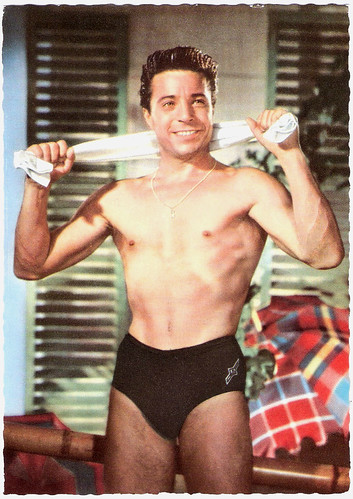
German postcard by Ufa (Universum-Film Aktiengesellschaft), Berlin-Tempelhof, no. CK-87. Retail price: 30 Pfg. Photo: Arthur Grimm / Ufa.
Women's hero
Peter Garden was born Karlheinz Rothmayer in München (Munich), Germany, in 1924. He was the son of the singer Karl Rothmayer.
After his military service, he attended the Musikhochschule Salzburg (the College of Music in Salzburg) and in 1947, he went to the Volksoper München (the People's Opera Munich).
In the early 1950s, he worked at the Bayerischen Staatsoperette (Bavarian State Operetta). He also made his film debut at that time. After two years at the Stadttheater Bern (the Municipal Theatre in Bern), he finished his stage career and returned to Munich to devote himself intensely to his film career.
He appeared in such comedies as Ein Herz bleibt allein/My Leopold (Géza van Bolváry, 1955), Ball im Savoy/Ball at the Savoy (Paul Martin, 1955) and Der Falsche Adam/The False Adam (Géza von Cziffra, 1955). He posed shirtless for beefcake photos and was groomed to become a romantic leading man like Rock Hudson in Hollywood.
Garden grew to bigger roles in light entertainment films like Dany, bitte Schreiben Sie/Dany, Please Write (Eduard von Borsody, 1956) with Sonja Ziemann, Schön ist die Welt/Fair Is the World (Géza von Bolvary, 1957), and Egon, der Frauenheld/Egon, the Women's Hero (Hans Albin, 1957). In 1959, he divorced his first wife, actress Christiane Jansen.
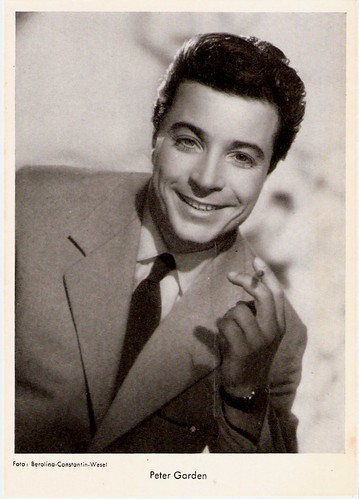
Dutch postcard. Photo: Berolina-Constantin-Wesel.
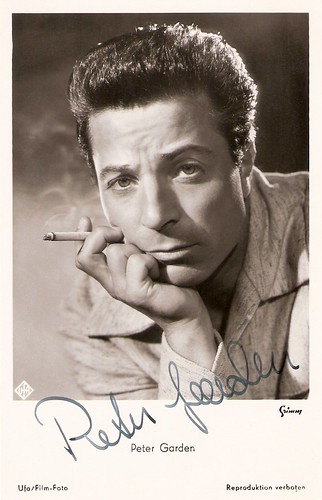
German postcard by Ufa-Film/foto, Berlin/Tempelhof, no. 3694. Retail price: 25 Pfg. Photo: Arthur Grimm.
Krimis
In the early 1960s, German cinema declined, and there were no more film roles for Peter Garden. He kept working for stage and TV. As a singer, he appeared in several TV operettas like Viktoria und ihr Husar/Viktoria and her Hussar (1965) at the side of such stars as Johannes Heesters and Rudolf Schock.
He played in Krimis (the typical German crime series) like Das Kriminalmuseum (1963-1964), and in the musical Polenblut/Polish Blood (Wolfgang Liebeneiner, 1966). He often performed together with his second wife, Margit Nünke, Miss Germany 1955 and Miss Europe 1956.
In the late 1960s, he was seen in dubious film comedies like Pudelnackt in Oberbayern/Completely Naked in Upper Bavaria (Hans Albin, Hans Billian, 1969) and Hugo der Weiberschreck/Hugo, the Woman Chaser (Hans Albin, 1969).
He fared better on television. As a TV host, he had his own shows like Die Peter Garden Party (1969-1970) and Schwarzer Peter/Black Peter (1970).
He also worked as a singer and recorded the LP 'Herzlichst Ihr Peter Garden'. He sang a duet with Margit Nünke, 'Jede Woche, die hat 7 Tage' (Every Week Has Seven Days).
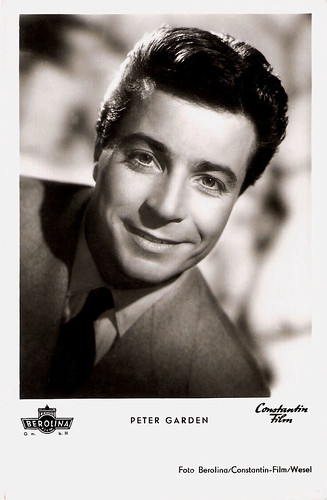
German postcard by Kunst und Bild, Berlin, no. T 631. Photo: Berolina / Constantin-Film / Wesel. Publicity still for Mein Leopold/My Leopold (Géza von Bolváry, 1955).
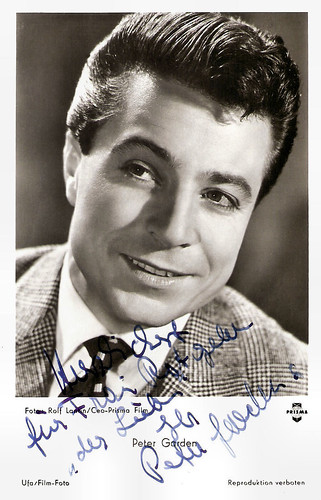
German postcard by Ufa, Berlin-Tempelhof, no. FK 3052. Photo: Rolf Lantin / Ceo-Prisma Film. Publicity still for Danny, bitte schreiben Sie/Danny, Please Write (Eduard von Borsody, 1956).
Gestapo confident
In the late 1960s, Peter Garden was at the height of his popularity, but parallel to his rising television popularity his past caught up with him.
German Wikipedia writes that already in 1967 penal preliminary proceedings were opened in Berlin against him because of his behaviour during the Nazi period. There were several press reports about a dark, unknown past of the 'Sunny boy'. In 1944, Garden/Rothmayer had been active in Salzburg as a paid Gestapo confident.
One of his victims, Alexander Anders, was quoted in the German magazine Der Spiegel: Garden/Rothmayer had thrown "a row of outstanding Salzburg citizens and families in trouble and misery". As a result of Garden's denunciation, Anders himself was arrested in Salzburg by the Gestapo and was condemned by a special court to three-year prison because of listening to foreign radio stations.
Anders and the Salzburg actor Herbert Fux started a petition in Salzburg and other places to reach a dismissal of Garden as a TV host by the ZDF (the Second German Television Channel). After this, the ZDF and their 'Black Peter' separated their ways.
Garden disappeared nearly completely from the public view and tried his luck as an inventor. In the 1970s he patented strange inventions like extendable shoes and folding skis in the US. In 1972, he married the actress Margit Nünke, to whom he was married until he died in 2015. Margit Nünke died three days later as a result of pneumonia.
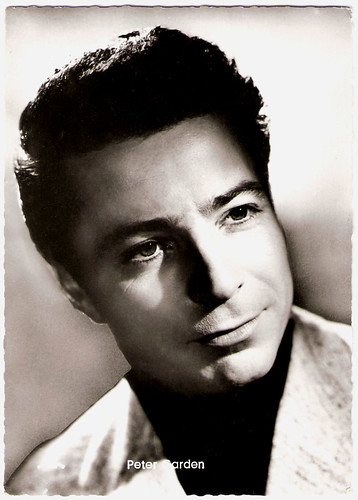
German postcard by JLB/Agfa, no. 512. Photo: Hoela / Panorama.
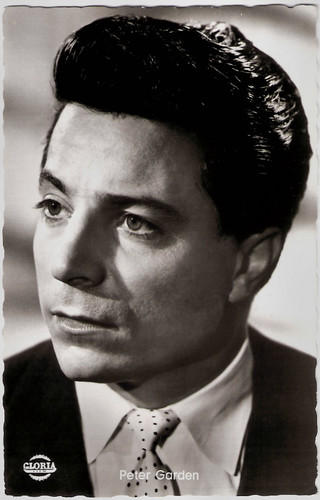
German postcard by Kolibri-Verlag, Minden/Westf., no. 2017. Photo: Gloria / Bayer. Publicity still for Kirschen in Nachbars Garten/Cherries in the Neighbour's Garden (Erich Engels, 1956).
Sources: Der Spiegel (German), Filmportal, Wikipedia (German) and IMDb.
This post was last updated on 3 May 2024.
3 comments:
Very Nice Blog
Thanks for all your comments. I really appreciate it.
Post a Comment